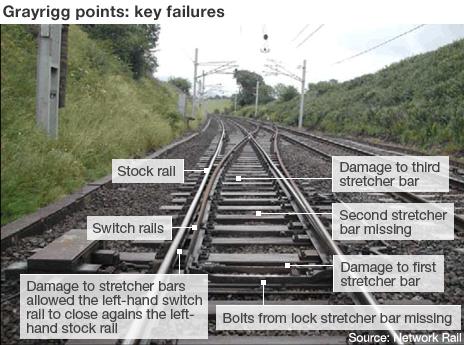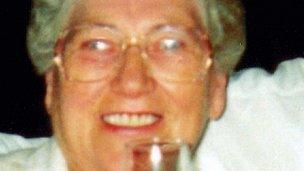Grayrigg train crash: Faulty points caused woman's death
- Published
Grayrigg inquest: Faulty points to blame for fatal crash
Poorly-maintained points were to blame for causing the death of an elderly woman in the Grayrigg train crash in Cumbria, an inquest jury has found.
Margaret Masson, 84, from Glasgow, died after the Virgin train derailed on the West Coast Main Line, in February 2007.
The train went over a "degraded" set of points at 92 mph and careered down an embankment, leaving 88 people injured.
Mrs Masson's daughter, Margaret Langley, said responsibility "lies at the door of Network Rail".
David Lewis, an engineer with the company, broke down in tears on Monday when he told the Kendal hearing he had forgotten to inspect the points near where the crash happened.

He said he was "under pressure" when he failed to check a section of the rail line five days before the derailment.
He told the inquest he felt like a man "spinning plates on sticks".
His colleague Paul Wills, an assistant track section manager, told the inquest that staff had to put up with "bully-boy" management.
The 11 jurors had heard how a subsequent Rail Accident Investigation Branch (RAIB) inquiry ruled the "immediate cause" of the crash was that the train had gone over a "degraded and unsafe" set of points, known as Lambrigg 2B.
One of three stretcher bars, which keep moving rails a set distance apart, was missing while the other two were fractured and bolts were missing.

Margaret Masson died of her injuries almost three hours after the crash
They also heard how Mr Lewis and his team were under-staffed, with workers not given the right tools or enough time to carry out checks.
Mr Lewis, who has since left Network Rail, had already warned his bosses about the "shambles", the jury was told.
Coroner Ian Smith said it was a "tragic irony" that the man who tried to flag up the problems was the man who missed the points-check days before the derailment.
Bob Crow, general secretary of the rail workers union, the RMT, called for a public inquiry into the management and operations of Network Rail.
He said: "Pressure for faster and more frequent trains led to unacceptable pressure on staff.
"Network Rail, with the full knowledge of the ORR (Office of Rail Regulation), is still failing to provide adequate time and staff to complete proper patrols and maintenance.
'Urgent inquiry'
"There remain systemic problems which have failed to be addressed since this derailment.
"We cannot wait for another derailment and another inquest to deal with these issues and now need an urgent public inquiry.''
Speaking after the hearing, Mrs Masson's son, George, 62, an engineer from Castlemilk, Glasgow, said he had initially blamed Mr Lewis, but now blamed his employer.
He said: "In my eyes it is negligence on Network Rail's part, not him (Mr Lewis).
Soyab Patel, solicitor for Margaret Masson's family: "There was a series of omissions and failures"
"The one that tried to make changes lost his job, his pension, he was not listened to from above.
"Before I knew anything about this I wanted to take his head off his shoulders.
"Now I totally respect him. He's got my utmost respect for what he tried to do. It's been swept under the carpet."
Network Rail managing director Robin Gisby said: "Network Rail has not hidden from its responsibilities, the company quickly accepted that it was a fault with the infrastructure that caused the accident.
"We again apologise to Mrs Masson's family.
"Since the derailment, Network Rail has worked closely with the authorities, conducted comprehensive and detailed investigations and made substantial changes to its maintenance regime."
Coroner Ian Smith said that in the coming week he would be issuing a report under Rule 43 of the 1984 Coroners Rules to the appropriate authorities.
One of the concerns raised would be the issue of track access for workers.
'Adequate standards'
A spokesman for the Office of Rail Regulation (ORR) said: "We welcome the conclusion of the inquest.
"ORR will now complete its investigation and will decide in accordance with prosecution protocol whether to bring criminal proceedings for health and safety offences."
Referring to the RMT comments, it said it had carried out a series inspections since the derailment.
"We have inspected to verify that Network Rail has adequate standards in place to maintain the track and that these standards are adequately implemented," it said.
"Our inspection work found a number of deficiencies and we have served five enforcement notices to ensure compliance."
- Published4 November 2011
- Published1 November 2011
- Published27 October 2011
- Published3 November 2011
- Published26 October 2011
- Published25 October 2011
- Published24 October 2011